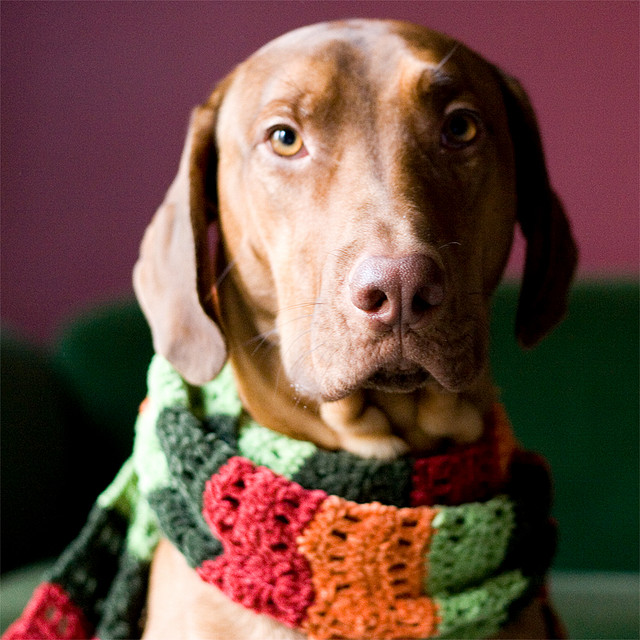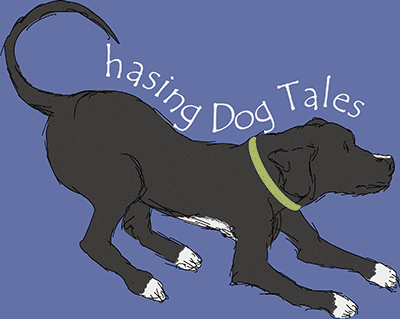
Photo by Andre Hagenbruch / CC BY-SA 2.0
Do you throw birthday parties for your pup or frequently dress your dog in doggie clothes?
Are you a “pet parent” instead of a “pet owner”?
Do you treat your dog like a human?
Almost all of us dog owners are guilty of anthropomorphism. Yes, it’s a long word, but it basically means we sometimes treat animals or objects as if they were human or have human-like traits. It’s a human tendency to want to treat our dogs like fur-covered versions of ourselves because they seem so human-like. They’re often compared to 2 or 3 year-old toddlers with respect to their intelligence and emotional levels and with their human-like facial expressions, it’s understandable why we sometimes treat our dogs like people. But there can be a downside to anthropomorphizing our dogs.
Most behaviorists agree that dogs don’t experience feelings such as greed, spite, revenge, guilt, stubbornness and hatred and they can’t understand our complex human feelings and emotions. Dogs operate with a more basic set of emotions. That may be disappointing for some dog owners to hear, but it makes it easier for us to evaluate and attempt to understand their behavior. We have to accept the fact that dogs don’t share our full range of human emotions and we need to relate to our dogs on their level, in a way they can comprehend. When we put ourselves in their paws, so to speak, and view the world from their perspective, we can better understand how to perform training, fix behavioral issues and create a better relationship with our dogs.
Have you ever anthropomorphized your dog in one of these ways?
These are all examples of how we impose our human feelings and emotions onto our dogs, often causing problems for both of us. Destructive dog behavior is usually caused by excess energy, boredom or teething, not spite or resentment. Dogs will raid trash cans and countertops because they’re scavengers by nature and haven’t yet been trained, not because they’re greedy and feel guilt afterwards. Many times we project our own feelings of guilt or sadness onto our dogs when we leave them home alone.
There’s still so much to learn about the intelligence, behavior and emotions of dogs, but one key to having a rewarding relationship with your dog is to understand that even though your dog seems to have a lot of human-like characteristics, always try to interpret their behavior from their perspective.
Do you ever treat your dog like a human? You can tell us, we all do it sometimes.

Of course I do…it’s so hard not to when they are such an integral part of your life.
So true! 🙂
I get jealous when people hug. I have to be in the middle, always!
Yes! Haley can totally relate to that, Chewy. 🙂
Totally. Thanks for sharing the downsides; it’s so important in training and life to understand that while dogs are part of our family, they may not think or act on things that way that we interpret. But yes, I’m guilty, we treat our dogs like humans in many, many ways.
Yep, we all can definitely related to that 🙂
Dogs are a distinct, sentient species with their own thought processes, feelings, drives, motivations and priorities. I feel that treating dogs like “little people in fur coats” instead of the wonderful creatures that they are is unfair to the dogs. It makes them neurotic and unstable — and very often fat. Dogs want to run and play and chew and sniff and roll in stinky things. They don’t want silly outfits or birthday parties or $365 Louis Vuitton dog collars. If you’re going to give those things to your dog, at least be honest with yourself about who you’re really buying them for. And then take your dog to the park so he can pee on unfamiliar trees — that’s what he really wants.
One of my pet peeves is when people refer to pets as their children. I have both children and pets. They are not the same thing! I adore — and often indulge — my animals. I enjoy their company and work really hard to make sure they are happy and healthy. I’ve bought furniture and vehicles based on how “dog friendly” they were, and I spend a good portion of my disposable income on quality food, veterinary care, pet supplies and unnecessary toys. However, my animals will never be on the same level as my children. Sometimes I prefer the company of my dogs, but I would sell my soul for my boys. I’ll willingly inconvenience myself for my dogs, but I would lay down my life for my children.
Kelley, I couldn’t have said it better! Having two sons of my own, I really dislike the term “pet parent” and I would never consider a pet being on the same level as my children, who I would also lay my life down for, without a second thought. Thanks for sharing such a meaningful comment.
I agree with this almost 100%. But do dogs really not feel jealousy? If not, what would would actually be going on if , let’s say, the dog pushes himself in between his owners, mostly during times of affection. I’ve read they may interpret this as playtime or that they don’t understand two people hugging– but to me it reads jealousy all the way. lol